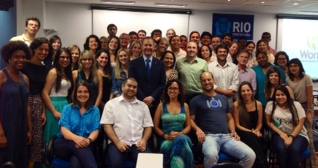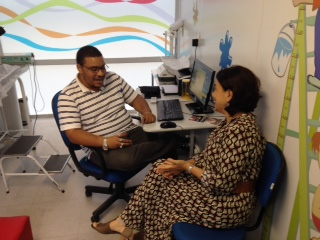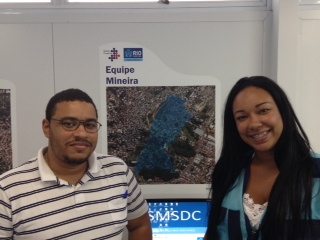From the President: a visit to Brazil

Photo: WONCA president, Michael Kidd, with enthusiastic family medicine trainees in Brazil.
Family Medicine and Family Health Teams: How Brazil is tackling Universal Health Coverage
español
Brazil is a global leader in addressing universal health coverage through family medicine teams. In November, in one of the favelas (“shanty towns”) of Rio de Janeiro, I had the opportunity to meet with family doctor Euclides Colaço and his colleagues. This visit allowed me to see the renowned “Family Health Team” model of Brazil in action.

Dr Colaço works with a family medicine resident, two nurses and six community agents (community health workers), providing comprehensive clinic-based and home-based care to a defined population of 4,500 people. There are now over 33,000 similar family health teams across Brazil and the government is seeking to expand the model further through its Mais Médicos (More Doctors) scheme to ensure that everyone of their 200,000,000 citizens has access to the high quality primary care provided through a well-trained and well-supported family health team.
Photo Family Health Team leader, Dr Euclides Colaco, consults with WONCA Iberoamericana CIMF regional president, Dr Inez Padula
I had travelled to Brazil to participate in a Global Forum on Human Resources for Health, convened by the World Health Organization (WHO) and the Global Health Workforce Alliance. This was the largest ever forum focusing on health workers and global health and involved Ministers of Health and senior health officials from 93 nations, making commitments to ensure that the nations of the world train enough health care professionals to meet universal health coverage projections, and that we are training the right people with the right skills to work in the locations and with the communities where they are most needed.
The role of family doctors in universal health coverage now well recognized and I was invited to address the forum on how primary care teams can be equipped, incentivized and empowered to provide high quality, first contact, continuous, comprehensive, coordinated, person-centred care, based in local communities.
Health workers are, of course, essential to health systems, yet the world faces a critical shortage of doctors, nurses and other health workers. If universal health coverage is to be achieved, then the WHO estimates that the world needs an additional 4 million health workers, based especially in areas and countries of greatest need. WONCA is a long-standing member of the Global Health Workforce Alliance, and our working party on rural practice, in particular, has been working closely with the Alliance and the WHO on ways to address workforce shortages in rural and remote regions.
 Photo: Dr Euclides Colaco with family medicine team community agent
Pryscila and a map showing the region their team covers in their local
favela in Rio de Janeiro
Photo: Dr Euclides Colaco with family medicine team community agent
Pryscila and a map showing the region their team covers in their local
favela in Rio de Janeiro
In the move towards universal health coverage, family medicine and especially team-based primary care, must play a central role, and family doctors can make significant contributions. In particular, there is recognition that a focus on primary care teams of well trained and supported health workers will enable such teams to better understand and meet community expectations, providing people-centred, holistic care while also strengthening health workers’ motivation and productivity.
It is also recognized that health workforce education and training is important to tackle stigma and discrimination and ensure responsive and appropriate health services for socially, culturally and religiously diverse groups, as well as across the age spectrum and for people with disabilities.
I was also invited at the forum to reflect on how new technologies have significant potential to support health workers providing universal health coverage. Mobile telephones and telehealth technology are helping to overcome the tyranny of distance in many parts of the world, while electronic health record systems can strengthen the responsiveness of the health system, through supporting health worker-patient relationships and the continuity and availability of patient-centred care. New technologies may also have the potential to motivate health workers through providing new information and training, and may have broader public health benefits in terms of offering health education and data for epidemiological and other research. It is critical that governments engage health workers in planning and implementing the integration of such technologies into health systems, with recent examples in some high income countries demonstrating the challenges arising from not doing so.
The forum statement,
The Recife Political Declaration on Human Resources for Health: renewed commitments towards universal health coverage, signed by the 93 health ministers and other government representatives present, is available at:
www.who.int/workforcealliance/forum/2013/recife_declaration_17nov.pdf
There were a number of documents launched at the forum including the new WHO report.
A universal truth: No health without a workforce, which has a strong focus on "reorienting health systems towards primary care ":
www.who.int/workforcealliance/knowledge/resources/hrhreport2013/en/
While in Brazil I also met with our WONCA Regional President for the Iberoamericana-CIMF Region, Inez Padula, and with members of the Brazilian Society of Family and Community Medicine, including President Nulvio Lerman and Vice President Thiago Trindade, and I was privileged to be invited to speak with family medicine residents in the new Barbara Starfield Auditorium in the society’s national centre in Rio de Janeiro. I also met in Brasilia with the Secretary for Health and senior members of the Brazilian Health Department, and shared my experience of some of solutions being found to the health workforce challenges in other parts of the world.
I left Brazil with a much greater appreciation of the great work of family doctors in this country, and an improved understanding of the family health team model, and the continuing challenges of seeking to provide high quality primary care to all the people.
You will have two great opportunities to join our colleagues in Brazil and learn about these developments for yourself and gain inspiration about how you might do things differently in your own country. First in 2014 at
WONCA’s world rural health conference in Gramado, in the beautiful mountain region in the south of Brazil, and then in 2016 at WONCA’s next world conference in Rio de Janeiro.
POSTSCRIPT
As this edition of WONCA News was going to press, the world was saddened by the news of the death of Nelson Mandela. We join our colleagues in South Africa in grieving the loss of this remarkable man whose influence touched so many lives.
Nelson Mandela gave us the gift of being someone we could all look up to. Someone who overcame great challenges with dignity. Someone with great compassion for humanity. Someone who used his great intellect and talent for leadership to make our world a better place.
Prof Michael Kidd
WONCA President